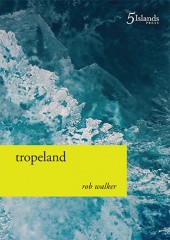
Tropeland by Rob Walker
Five Islands Press, 2015
South Australian poet Rob Walker’s latest collection, tropeland, is exceptionally playful. Puns and wry twists in language are balanced with humour and a self-conscious sense of otherness, the speakers always slightly displaced from their subjects. Walker is not pessimistic in this process however; there is a consistently optimistic tone throughout tropeland, as well as a canny awareness of failings and ironies in life.
To pin down tropeland structurally is to do the text no justice. Walker is diverse in his renderings of themes, foci and poetic processes, constantly shifting from one style to another but still maintaining a firm sense of self and the importance of open-minded observation. The poems observe nature, people and places in equal turns. Some of the more interesting poems include a five-part examination on trees, addresses to other poets and a number of reflections on Japan.
There are strong moments of empathy throughout the collection. ‘Crying at the Poetry Reading’ condemns a perceived lack of emotional engagement in poetic responses:
there is a poet crying. she read her poem earlier. now it is not her turn to read. it’s her time to cry. perhaps the cheap cardboard wine loosened a sad memory, sent it spilling onto the floor, a moan leaking from her eyes. the other poets ignore her, embarrassed. dictionaries with hair. bower birds of words. after all, she’s had her turn. besides, they prefer their emotions to be distilled to an essence, boiled away to leave a black residue on white paper.
It is unclear why such tears are warranted, but that is not the issue. Rather, the aversion to this display is chided. This snapshot encourages openness, rather than timely polite displays of necessary emotions. For Walker, emotional engagements are not timed precisely through the text either; these poems and situations are acknowledged with frank immediacy as and when required throughout the collection. The nudging criticism of ‘Crying at the Poetry Reading’ sits amongst more directly motivated pieces on loss and decisions about life and death such as ‘Watching My Blind Cat’ and ‘Clearview’, providing some particularly touching engagements with family and pets. Even though tropeland appears in three sections, there is no discrimination between the personal and public.
A sense of otherness is frequently addressed in the collection, but without the result that the speaker is ever in a position of discomfort. Linguistic barriers and getting lost in unfamiliar locations alike are presented with a frank playfulness that invites both tolerance and recognition of such differences. ‘A Clarity of Smog’ maintains not only the collection’s opening focus on wordplay, but also emphasises a sense of comfortable otherness. The unfamiliar is to be enjoyed rather than subverted or challenged in this piece:
nine days in Japan and already you’re a megalomaniac drunk on the fame of being slightly apart backhome there are bushfires and The Test on TV but here you’re in the manic phase of a bipolar New Year …
The speaker moves self-consciously to an interior sense of location, after an initial disruption getting lost between train stations, buoyed by a growing confidence.
… you know in your bones that the sun rising red through smog is rising just for you and despite the photochemical haze there’s a clarity like individual rainbow ice crystals refulgent on dead rice stalks beneath your feet … the entire day is unfolding. you don’t need a god when the Universe is so perfect and selforganised. each day dripping into the vast pool of dayspent. occasionally we find ourselves at an intersection where any choice will be the right one.
It is this sense of diligence and confidence that permeates much of the collection, alongside a healthy dose of sardonic humour from time to time. A parallel to this experience can also be seen in the five-part poem ‘Araucarias of Gondwana (Tree Dinosaurs)’, especially in ‘V. Norfolk Pine’, in which the speaker reflects on the diasporic origins of the tree in question and its prevalence in resorts:
in the Pacific your point of origin
a speck of pollen
but a diaspora deliver you
to every beach resort
your trunk adolescent slim-muscled,
smoothskinned with occasional
acne and zits
your substitute leaves
scimitars
of baby claws
stockwhips for the kiddies
there’s surfwax oozing from your pores
yet the swell keeps slipping away
from your toes
you reach for the sky
you organic pyramid
and I’ll sit in your shade licking
a pine-lime Splice, our backs together, staring out towards the horizon
The tree is utterly connected with human activity and intention, but Walker’s speaker finds a place for sympathy and kinship in recognition of its otherness. Throughout the collection as well there is a strongly anti-exploitative tone with regards to nature, already firmly established in this piece.
tropeland is exceptionally dynamic. Rob Walker utilises a range of forms to explore a number of issues and settings with deftness, humour and sympathy all at once. Comedy and criticism come together other in the same poems, and offer multiple angles for further interpretation.









